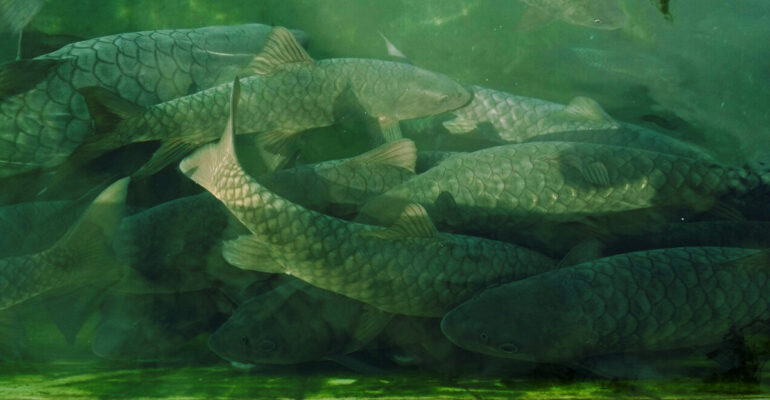Armed with a Legend, IPB Students Research the Conservation of Deity Fish

Deity fish (Labeobarbus douronensis) is a very rare and location-specific fish. This fish, which is a typical endemic of Kuningan, cannot yet be bred with any hatchery technology even though it is still a family of carp (Cyprinus carpio).
Attractions that have a pool where the god fish habitat is one of them is Cibulan. The existence of the god fish in Cibulan is guarded by the Brass community’s belief in the legend of the god fish.
Three students from multi departments and across generations at IPB University who are members of the Student Creativity Program in the field of Social Humanities Research (PKM PSH) conducted research related to the effectiveness of the existence of brass folklore on the preservation of god fish. The team consisting of Dian Arinta Putri, Fahrudin Ahmad, and Enita Indah was guided by Dr. Ir Rilus A Kinseng. This research is motivated by the phenomenon of the surrounding community consider fish gods that inhabit Cibulan balong not fish carelessly.
Dian explained, the research was carried out in Maniskidul Village, Jalaksana District, Kuningan Regency, West Java Province. Determination of the location is because in this area the most visible customary norms originating from the legend of the god fish are told down through generations and its existence is still maintained by the people. This is interesting because the people of Maniskidul Village strongly maintain the preservation of deity fish that live in their villages even though these rules are derived from public trust and are not written rules in the law.
“The existence of the god fish in the Cibulan tourist pool is still maintained because the Brass community’s trust in the privilege of the god fish. Kancra bodas fish or fish deity are known as warriors from Prabu Siliwangi who were condemned by Prabu Kiansantang who was the son of Prabu Siliwangi. Until now the story is still attached to most of the people of Kuningan Regency, “he added.
Naturally, the condition of the deity’s fish is maintained for hundreds of years because there is no catch by the people. This condition is also supported by the role of the community who continue to keep Cibulan waters clear so that the gods do not lose their habitat. All of this is based on the knowledge and trust of the people about the legend of the god fish which continues to be preserved for generations.
“This deity fish has an attractive charm among people who visit Cibulan waters. This god fish, in my opinion, is special, that is, it doesn’t emit fishy smell and is very friendly to humans. “God fish food is also not a pellet like fish in general but more like human food, his favorite food is red apple,” Dian said.
This fish looks beautiful with shiny gray scales if lifted from the pool, but when put back in the water it will look colored in a blue sky tinge. This fish is only ‘according to the handler’, so no one has ever caught this fish other than the handler.
The folklore of Kuningan has traditionally served as a guide and controlling people’s behavior in an effort to conserve the surrounding natural environment, especially for the survival of god fish.
“We hope that hopefully the deity fish will continue to be guarded by the community until the technology of producing seeds is found by experts in the field of fisheries. Even though later the fish seed production technology has been found, hopefully the fish that live in this nature will be protected and there should be no wild fishing, “he concluded. (FI / Zul)



